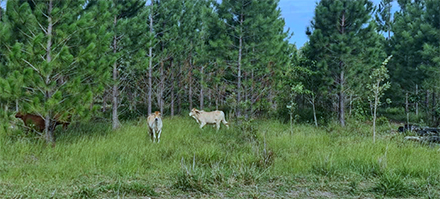Cattle Australia (CA) has launched its Land Management Commitment (LMC) strategic policy, which emphasises the primacy of agricultural land and includes definitions of deforestation and forest in the Australian context, along with four recommendations for implementation. Source: Timberbiz
CA Chief Executive Officer, Dr Chris Parker, said the LMC was a vital piece of work centred on the continued development of a national framework that grows efficient and resilient beef businesses, thriving rural communities, and protects and enhances the unique Australian environment.
“Through this work, CA has undertaken the necessary assessment of voluntary international frameworks, the European Union Deforestation Regulation (EUDR) and the unique Australian context, to provide a clear pathway to deliver sustainable beef products to both our domestic and international customers,” Dr Parker said.
“In a modern global context where Australia is a key player in the global beef trade, exporting over $10 billion annually, the alignment of Australian definitions with global definitions to ensure equivalency is crucial.
“Globally, there is clear recognition of the importance of food production, and Australian definitions enable us to demonstrate the Australian regional context and the land management practices vital to maintaining food production, healthy landscapes and biodiversity.”
Dr Parker said the implementation of the LMC definitions and recommendations would result in more certainty for Australian beef producers as they manage agricultural land to produce high-quality beef for the world. In addition, land management practices would continue for the benefit of the environment and biodiversity and ensure equitable market opportunities.
“The outcome of the work is a decision tree model and educational information on the routine land management practices supported by the Australian State, Territory and Federal legislation through case studies, to ensure easy implementation for producers and the wider industry.”
Under the LMC, deforestation is the illegal clearing of trees on land, used for agricultural and non-agricultural purposes, that violates vegetation management laws and where trees exceed forest thresholds.
Agricultural land is defined as land used for the production of food and fibre, including the grazing of livestock.
Agricultural land use is demonstrated under the national Australian Land Use Management (ALUM) Classification system, with the majority of Australian grass-fed beef produced on Class 2 land type – Production from Relatively Natural Environments.
Dr Parker said Australian producers already abide by some of the strictest vegetation management laws in the world, and the LMC would complement these to ensure the beef sector, and broader agriculture, can continue demonstrating sustainability credentials to meet changing market access requirements.
“Australia has more than 136 existing vegetation laws embedded in State, Territory and Federal legislation that protects the environment and biodiversity, representative of the complexity of the 89 bioregions within the Australian landscape,” Dr Parker said.
“As custodians of more than 50% of the country’s land mass, the Australian grass-fed beef industry grazes on 325 million hectares of native vegetation and over 46 million hectares of modified pastures.
“We are proud to play a part in ensuring the sustainability and prosperity of our environment for generations to come through responsible land management – a role we take extremely seriously.”
Forest is defined as an area, incorporating all living and non-living components, dominated by trees having usually a single stem and a mature or potentially mature stand height exceeding two metres, and with existing or potential crown cover of overstorey strata about equal to or greater than 20 per cent.
Forest does not include land that is predominantly under agricultural use in line with international definitions.
Dr Parker said despite the campaigns of industry detractors, the beef sector’s sustainability credentials are clear.
“Australia sits in the top 10 countries globally for protected forest area, with 36% of Australia’s forest on land managed for conservation purposes,” he said.
“The total legal land clearing and re-clearing of native forests was 0.134pc in 2020-21, and there has been a net positive change in forest for the past 16 years since 2008.
“Invasive plants, pests and diseases are now the number one contributor to biodiversity loss in Australia, which producers spend $5.3 billion annually managing.”
To ensure the beef industry can demonstrate its sustainability credentials to attract incentives for biodiversity, market access, and strategic growth, the LMC work has identified four key recommendations:
- Australian government to manage an accurate and up-to-date (updated annually) national dataset to demonstrate through satellite mapping, agricultural land use, nature and biodiversity.
- Ensure equivalency with international standards that support producers operating within the Australian context in maintaining market access to both domestic and international markets, and ensure technical barriers to trade are compliant with World Trade Organisation rules.
- Industry and government tools must be accessible to enable producers to demonstrate the benefits of the co-existence of beef production and biodiversity outcomes.
- Empower strategic agricultural growth through sustainable development plans that detail strategies that ensure food security, regional economies and local ecosystems are not compromised.
Dr Parker said Australian beef producers are already world leaders in environmental and biodiversity management practices.
“The LMC work has been undertaken at a time when the supply chain and financial sector are being caught under a broader trend requiring global businesses to publicly disclose the actions they are taking to promote sustainable outcomes for the planet,” Dr Parker said.
“These definitions and recommendations are simply a means to ensure we maintain our world-leading reputation and can respond to the changing market access requirements.
“The Australian beef industry plays a crucial role in addressing the world’s food security and climate challenges by exporting 70pc of our product to over 100 countries globally. It is vital this role is recognised, and the industry is supported by both the Government and the Australian people.”
Read the full Land Management Commitment strategic policy at https://cattleaustralia.com.au/wp-content/uploads/2024/09/CA-LMC-Paper-WEB_FINAL.pdf





